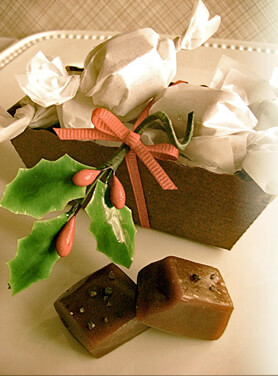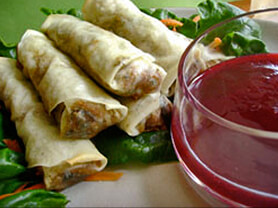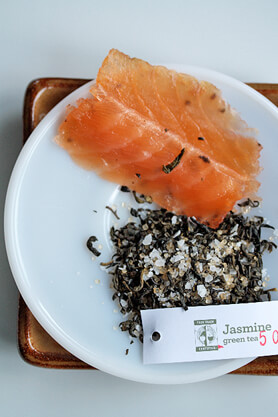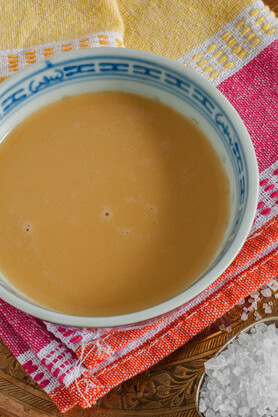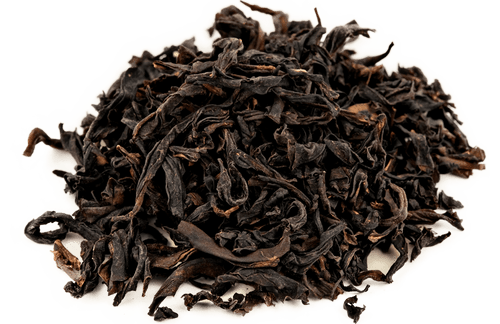Organic Lapsang Souchong Black Tea

This Fair Trade Certified organic tea from the Fujian province of China is smoked during manufacture, giving it a distinctive flavor and aroma, sometimes referred to as tarry. It has a light body, with a smooth crisp character and a very prominent, heady aroma of a pine wood fire.
Legend claims that the smoking process that produces this remarkable organic black tea was discovered by accident. During the Qing dynasty, an army unit passing through the village of Xingcun camped in a tea factory filled with fresh leaves awaiting processing. When the soldiers left and the workers could get back into the factory, they realized that to arrive at market in time, it was too late to dry the leaves in the usual fashion. So they lit open fires of pine wood to hasten the drying. Not only did the tea reach the market in time, but the smoked pine flavor created a sensation! Today, this organic tea from China is dried over smoking pine fires in order to absorb the smoke flavor. Lapsang Souchong is generally consumed with sugar, milk and/or lemon.
Ingredients: organic and Fair Trade Certified Chinese black tea
What are Scented Teas?
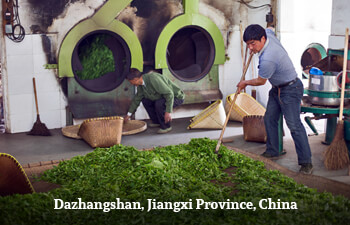
Scented teas begin with the same top-quality organic tea as our non-scented teas, but are exposed to a particular scent during manufacturing. As a result, the tea absorbs and retains the aroma throughout its lifetime. Some of the most well known scented teas are combined with flowers such as jasmine, magnolia, and osmanthus. Others, such as Lapsang Souchong, are more savory and scented with smoke. Scented teas are often confused with flavored teas (which is why we include them in our flavored tea categories), but are technically unflavored. Sometimes, inferior forms of scented tea are mimicked by using a flavoring - rest assured, you’ll never find these among our catalog.
Steeping Instructions
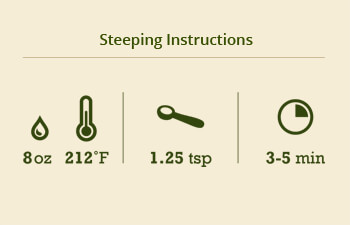
At Arbor Teas, we believe tea should be brewed to suit your personal taste. We’re happy to make recommendations to get you started, but don’t hesitate to experiment! When brewing your tea, your main considerations are tea quantity, water temperature, and steeping time. We recommend black teas to be steeped for 3 to 5 minutes in water heated to a full, rolling boil. For the best flavor, use fresh water whenever possible, and avoid overboiling. Try not to steep your tea longer than necessary, as you’ll extract undesirable bitterness from the leaves. If you want a stronger brew, don’t steep longer, just use more tea. And don’t forget to re-steep your tea leaves to get the most out of your leaf!
Looking for more info? Check out our How-To Guides and Eco-Brewing Tips!
Staff Perspectives
 Chelsea
Chelsea
"I often brew a strong batch of this and freeze it into ice cubes for interesting cocktails! I also like cooking with this to add a smoky flavor to dishes. I love how versatile this tea is!"
 Sarah
Sarah
"This is a family favorite! Even my 10 year old likes it! My husband and I always seem to brew it on a Saturday afternoon after spending the morning with the kids."
 Aubrey
Aubrey
"This tea reminds me of liquid smoke floating in my mouth - a unique experience."
Health Benefits
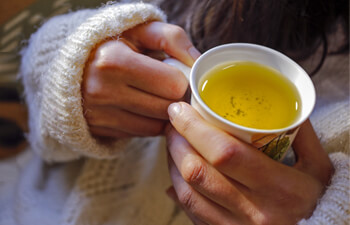
Like all true tea, black tea offers many potential health benefits. Research has found that tea (Camellia sinensis) can have many positive effects on human health, including improved cardiovascular function, cancer risk reduction, improved immune function, improved oral health, and help with weight management. Tea is also full of polyphenols, which are a class of antioxidant that help your body maintain homeostasis and balance your stress levels. Black tea specifically has been found to regulate blood sugar in diabetics better than other types of tea, according to a study done by the University of Massachusetts Amherst.
For more information about the health benefits of black tea and other types of tea, and for direct sources of the above information, check out our Tea Health Benefits page!
Please note: the information above is for educational purposes only and has not been evaluated by the Food and Drug Administration. This information is not intended to diagnose, treat, cure, or prevent any disease.
Russian Samovar Tea
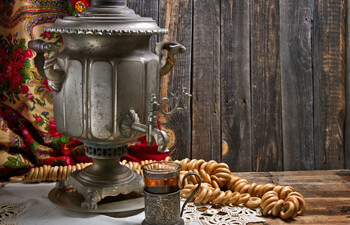
Given the significant influence Asian culture has had on Russia through the years, it is no wonder that Russians are big tea drinkers. The samovar, which is somewhat of a cross between a hot water heater and teapot, is one of many examples of this influence - it is presumed to have evolved from the Tibetan hot pot. The function of this unique apparatus, and the Russian method of taking tea, is rather different than we are accustomed to in the west. Instead of heating tea water on the stove, wood or charcoal is traditionally burned within the samovar itself to accomplish this task (modern samovars often use an electric heating element, however). A small teapot sits on top of the samovar, in which a dark, concentrated brew is made, called zavarka. Hot water from the samovar is used to dilute this tea when served. Dark Indian or Chinese black teas are commonly used, often coupled with herbal or fruit teas and enjoyed with lemon and/or jam. Russian Caravan, a blend of black teas with a slightly smoky flavor, is a favorite. To this day, samovars remain a focal point of the Russian home.
For even more information about this and other traditions, visit our Tea Traditions Page!







